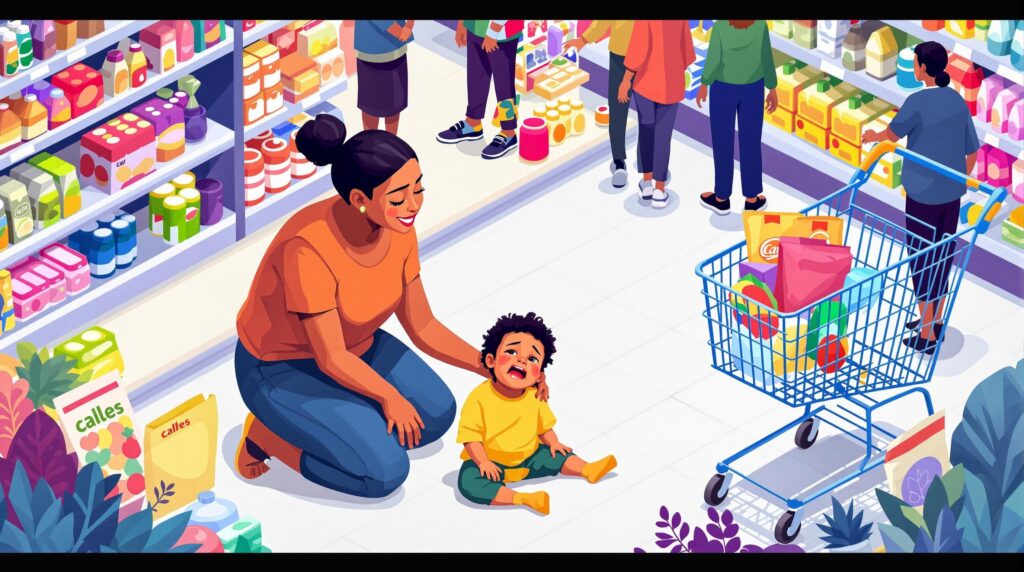Table of Contents
ToggleParenting a toddler can be a rollercoaster ride, especially when it comes to handling public meltdowns. These sudden outbursts of emotion can catch even the most prepared parent off guard. But don’t worry, I’m here to help you navigate these challenging moments with grace and confidence.
Understanding Toddler Meltdowns: Developmental Factors at Play
To tackle public meltdowns effectively, it’s crucial to understand what’s happening in your little one’s rapidly developing brain. Children aged 2-4 are experiencing a whirlwind of growth in their cognitive, language, and social-emotional skills.
During this stage, known as the preoperational stage (ages 2-7), your child is learning to use language to express themselves and engage in symbolic play. However, their logical thinking is still limited, which can lead to frustration when they struggle with concepts like time or cause and effect.
For example, your toddler might throw a fit in the grocery store because they can’t understand why they can’t have a cookie right now, even though you’ve explained dinner is in an hour. Their brain simply can’t process the concept of waiting or delayed gratification yet.
The Science Behind Public Tantrums
Toddlers often experience meltdowns due to a perfect storm of factors: frustration, tiredness, or overstimulation. Their limited ability to regulate emotions and communicate effectively can turn a small disappointment into a full-blown tantrum.
Separation anxiety, which typically peaks around 18 months, can also contribute to public meltdowns. Your child might become distressed when you’re in an unfamiliar environment, triggering a tantrum as a way to cope with their anxiety.
Understanding these underlying causes can help you approach meltdowns with empathy and patience, rather than frustration or embarrassment.

Anticipating and Preventing Meltdowns
The old saying “prevention is better than cure” couldn’t be more true when it comes to public tantrums. By focusing on developmental surveillance and anticipatory guidance, you can often sidestep meltdowns before they happen.
Prepare Your Child for Outings
Before heading out, take a moment to explain what’s going to happen and what you expect from your child. This can help reduce anxiety and set clear boundaries. For instance, you might say, “We’re going to the store to buy groceries. I need you to stay close to me and use your inside voice. If you do a good job, we can stop at the park on the way home.”
Establish Routines
Children thrive on predictability. Establishing consistent routines can help your child feel more secure and less likely to act out. This might include a regular bedtime routine, meal times, or a special ritual before leaving the house.
Use Positive Reinforcement
Catch your child being good and praise them for it. This encourages them to repeat positive behaviors. For example, “I love how you’re walking next to me in the store. That’s being such a big helper!”
Creating a Supportive Environment
Your child’s environment plays a significant role in their behavior. By making a few adjustments, you can create a space that’s less likely to trigger meltdowns.
Adjust Environmental Factors
Pay attention to factors that might overwhelm your child, such as loud noises, bright lights, or crowded spaces. If possible, choose quieter times for errands or bring noise-canceling headphones for sensitive children.
Provide a Calm Atmosphere
Create a safe space for your child to express their emotions. This might be a quiet corner at home or a favorite stuffed animal they can hug when feeling overwhelmed in public.
Set Clear Boundaries
Establish and consistently enforce rules and expectations. This helps your child understand what’s acceptable behavior and what’s not. Remember, consistency is key – children often test limits to understand their world better.
Effective Responses to Public Meltdowns
Despite your best efforts, meltdowns can still happen. When they do, here’s how to handle them effectively:
Stay Calm
Your reaction sets the tone. Take a deep breath and remind yourself that this is a normal part of development. Your calm demeanor can help de-escalate the situation.
Provide Comfort
Offer physical comfort if your child wants it. Sometimes, a hug or holding your child can help them feel secure and calm down faster.
Redirect Attention
Try to distract your child with something interesting. This could be a favorite toy, a funny face, or an engaging question about something they love.
The Power of Parental Involvement
Your involvement as a parent is crucial in managing and preventing public meltdowns. Here’s how you can make a difference:
Open Communication
Encourage your child to express their feelings and needs. This might sound like, “I can see you’re feeling frustrated. Can you tell me what’s bothering you?”
Model Good Behavior
Children learn by example. Show them how to handle frustration and disappointment calmly. If you make a mistake, apologize and explain how you’ll do better next time.
Teach Emotional Regulation
Help your toddler understand and name their emotions. This can be as simple as saying, “You seem angry right now. It’s okay to feel angry, but it’s not okay to hit. Let’s take some deep breaths together.”
Long-Term Benefits of Positive Meltdown Management
Handling public meltdowns with patience and understanding isn’t just about getting through the moment – it has long-lasting benefits for your child’s development.
Better Emotional Regulation
Consistent and supportive parenting during meltdowns helps your child develop healthier emotional regulation skills. Over time, they’ll learn to manage their feelings more effectively on their own.
Improved Behavioral Outcomes
Children who learn to handle their emotions well often have fewer behavioral problems as they grow older. They’re more likely to have positive social interactions and succeed in school.
Stronger Parent-Child Bond
By responding to meltdowns with empathy and understanding, you’re building a stronger, more trusting relationship with your child. This bond will serve as a foundation for open communication and mutual respect as they grow.
Remember, every child is unique, and what works for one might not work for another. Don’t be afraid to experiment with different gentle parenting techniques to find what suits your family best. With patience, consistency, and lots of love, you’ll be able to navigate public meltdowns with confidence and grace.
Sources:
Developmental Milestones
Major Theories of Child Development
The NICHD Study of Early Child Care and Youth Development











